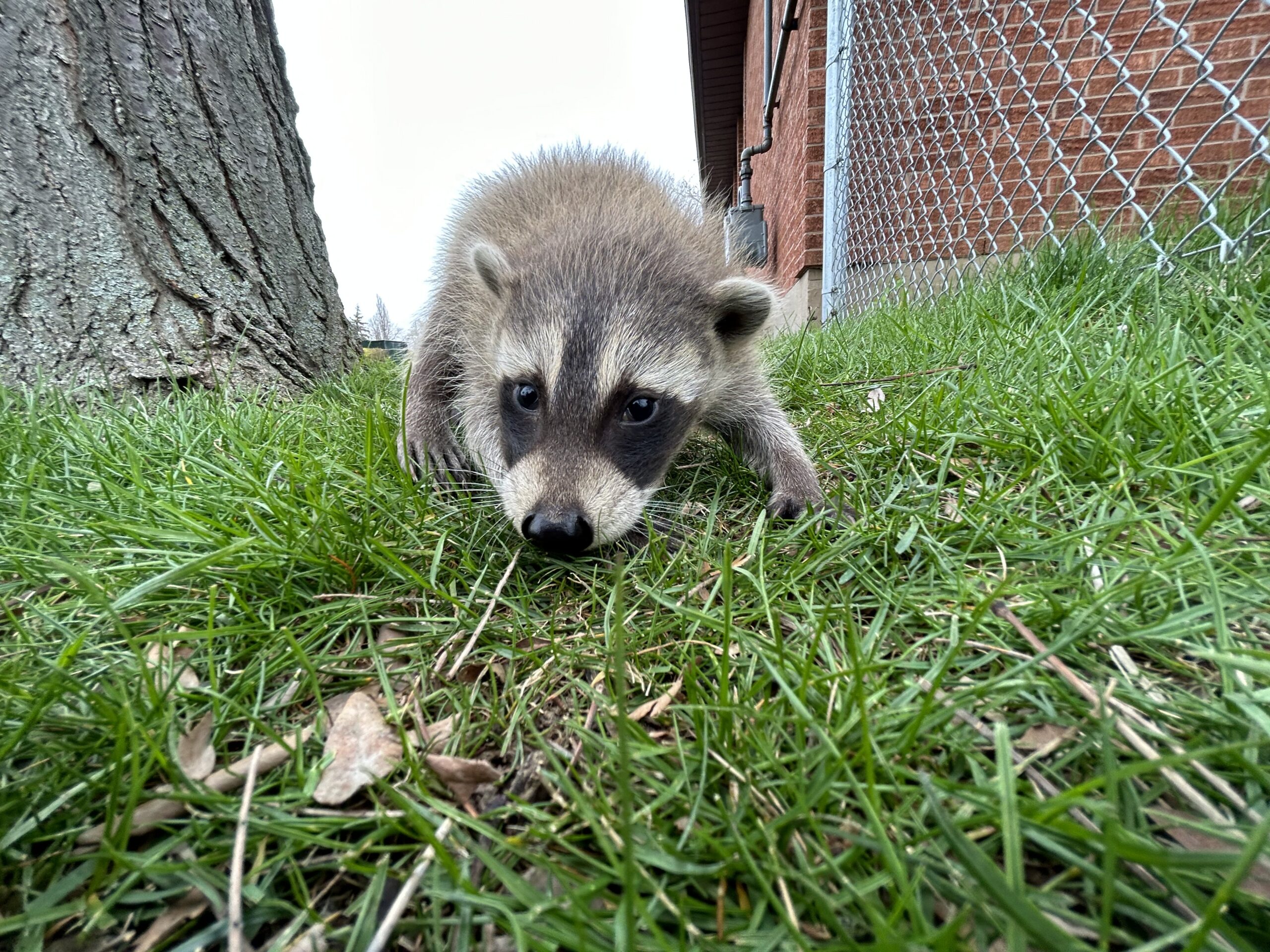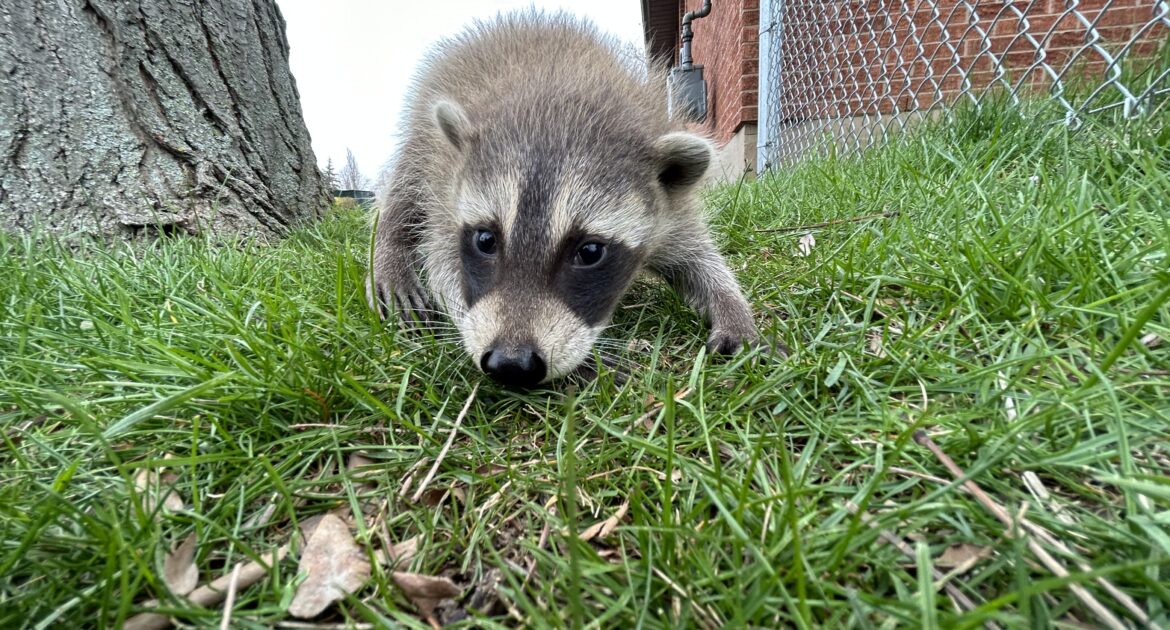When the sun sets over Mississauga and the bustling sounds of the city fade to a quiet hum along the banks of the Credit River, a different kind of activity begins. If you’ve recently spotted raccoons in your yard at night rummaging through your garden or exploring your property, you might be wondering whether you should be concerned. At Skedaddle Humane Wildlife Control, we understand that sharing your outdoor space with these masked visitors can raise questions about safety, property damage, and what to do next.
These animals are remarkably intelligent creatures that have adapted exceptionally well to urban environments like Mississauga. Their dexterous paws, problem-solving abilities, and opportunistic nature make them perfectly suited for finding food and shelter in residential neighbourhoods.
While occasional raccoon visits might seem harmless, understanding raccoon behaviour in your yard is essential for determining whether their presence signals a potential problem for your home and family.
When Raccoons Are Most Active
Raccoons are primarily nocturnal animals, meaning they’re most active between dusk and dawn. This natural behaviour explains why you’re likely to spot them exploring your yard during evening hours, and their presence may be more noticeable during certain seasons.
Why Raccoons Visit Residential Yards
There are several reasons why they might be frequenting your property:
- Food sources: Raccoons are opportunistic omnivores with diverse diets. They’re attracted to easily accessible food like unsecured garbage cans, pet food left outdoors, fallen fruit from trees, and even bird feeders.
- Water accessibility: Like all wildlife, these animals need reliable water sources. Birdbaths, ponds, or even water that collects in flowerpots can attract them.
- Shelter opportunities: These animals are constantly seeking safe places to rest and potentially den. Dense shrubbery, spaces under decks, woodpiles, or even your attic could be appealing shelter options.
- Established pathways: Raccoons often create regular travel routes through neighbourhoods. Your yard might simply be part of their nightly rounds as they move between feeding and denning areas.
Recognizing Signs of Raccoon Visitors
Even if you haven’t directly spotted raccoons, there are telltale signs they’ve been in your yard:
- Physical Evidence: Look for distinctive five-toed footprints (similar to tiny human handprints) in soft soil or mud near your garden or water sources.
- Disturbed Areas: Overturned garbage cans, displaced covers on compost bins, or dug-up portions of lawn (especially where grubs might be found) suggest raccoon activity.
- Droppings: Their feces are typically dark and tubular, often found in concentrated “latrine” areas that raccoons reuse.
- Nighttime Noises: Distinctive chattering, growling, or rustling sounds after dark might indicate a raccoon presence.
Understanding these patterns of raccoon behaviour in your yard can help you determine whether their visits are casual or if they’re establishing a more permanent presence on your property.
Health and Safety Concerns with Raccoon Visitors
When these animals make regular appearances in your yard, certain health and safety considerations should be on your radar.
Disease Risks Associated with Raccoons
Raccoons can carry several pathogens that pose potential health risks:
- Raccoon Roundworm (Baylisascaris): This parasitic roundworm’s eggs can be present in raccoon droppings. If accidentally ingested, they can cause serious neurological illness, particularly in children.
- Leptospirosis: This bacterial infection can spread through raccoon urine, contaminating water or soil, potentially affecting humans and pets.
- Rabies: While not all raccoons carry rabies, they are a primary carrier in many regions. Any unusually aggressive or disoriented behaviour could indicate a rabid animal.
- Giardiasis and Salmonella: These bacteria can be transmitted through contaminated water sources or areas where raccoons have defecated.
It’s important to note that simply having raccoons pass through your yard doesn’t automatically mean disease exposure. The risk increases when they establish latrines (communal defecation areas) on your property or when they move into structures like attics or under decks.
Property Damage Concerns
Beyond health considerations, raccoons can cause various types of property damage:
- Lawn damage: Their habit of “grubbing” (digging for insects and larvae) can leave patches of torn-up grass and soil.
- Garden destruction: Raccoons are notorious for raiding gardens, particularly when fruits and vegetables are ripening.
- Structure damage: If raccoons decide your property offers potential den sites, they can damage soffits, roof vents, and other vulnerable areas to gain access to attics or crawl spaces.
- Opening pathways for other wildlife: Once raccoons create access points to structures, other wildlife may follow.
Is Regular Raccoon Activity a Warning Sign?
Not all raccoon visits warrant immediate concern, but certain patterns should alert homeowners to potential problems.
When Occasional Visits Turn into Problematic Patterns
Occasional raccoon sightings at night typically represent normal wildlife activity and aren’t cause for major concern. However, certain behavioural shifts may signal developing problems:
- Daytime Activity: Raccoons are primarily nocturnal, so regular daytime appearances (unless it’s a mother with young) might indicate illness or unusual desperation for food.
- Territorial Behaviour: If raccoons appear aggressive, defensive of certain areas, or don’t scare easily when humans approach, they may be protecting a nearby den site.
- Repeated Visits to Specific Areas: Regular activity around your home’s foundation, deck, shed, or roof could suggest they’re assessing potential entry points for denning.
- Multiple Raccoons Together: Outside of mating season or mother-offspring groups, seeing multiple adult raccoons together might indicate an abundant food source that’s attracting them.
The Seasonal Factor in Raccoon Behaviour
Understanding the seasonal patterns of raccoon behaviour can help contextualize their presence:
- Spring (February to July): This is raccoon baby season in Mississauga. Mother raccoons actively seek secure denning locations for their kits, making them more likely to attempt entry into structures.
- Summer: Young raccoons begin learning to forage with their mothers, increasing visible raccoon activity. In Mississauga’s hot summer months, these animals may seek cooler, shaded areas during the day.
- Fall: Raccoons increase food intake to prepare for winter, potentially making them more persistent around food sources as they build fat reserves.
- Winter: While not true hibernators, raccoons reduce activity during cold periods, sometimes denning together in sheltered locations—potentially including your attic or crawl spaces.
Effective Strategies for Preventing Raccoons in Your Yard
If you’re concerned about raccoons in your yard, proactive prevention is your best approach. These strategies focus on making your property less attractive to these intelligent creatures.
Eliminating Attractants
The most effective way to discourage raccoon visits is to remove what’s drawing them to your property:
- Secure garbage bins with locking lids or bungee cords. In Mississauga, where green bins are common, ensure they’re properly closed, especially at night.
- Feed pets indoors or pick up food dishes after pets eat. Never leave pet food outside overnight.
- Maintain bird feeders properly by using catch trays and cleaning up spilled seed regularly. Consider taking feeders in at night during persistent raccoon activity.
- Harvest ripe fruits and vegetables promptly from gardens and pick up fallen fruit from around trees.
- Eliminate water sources like standing water in containers, unsecured birdbaths, or pet water bowls left out overnight.
- Keep compost properly contained in secured bins rather than open piles.
Habitat Modification
Making your yard less inviting to raccoons can significantly reduce visits:
- Trim tree branches that overhang rooflines to eliminate natural access routes to your roof.
- Secure shelter areas by blocking access under decks and sheds with mesh or lattice.
- Install motion-activated lights to startle nocturnal visitors and discourage them from exploring further.
A regular inspection of your property’s perimeter and any potential entry points is also recommended to ensure raccoons are not finding new ways to access your space.
Contact Skedaddle for Expert Raccoon Control
Understanding when to take action is crucial in managing raccoon activity. If you notice significant signs of raccoon presence or feel uncertain about how to proceed, professional wildlife control is an effective solution. Skedaddle offers expert advice and humane removal processes to ensure your home remains raccoon-free.
At Skedaddle, our team is dedicated to helping Mississauga residents maintain safe properties by providing wildlife control solutions tailored to your needs. With our specialized knowledge and comprehensive services, you can feel confident in protecting your home from the nuisances posed by raccoons.
If raccoons are invading your yard and property, don’t hesitate to reach out to us for effective and humane solutions. Secure your home today with Skedaddle and keep your property safe and sound for you and your family.




